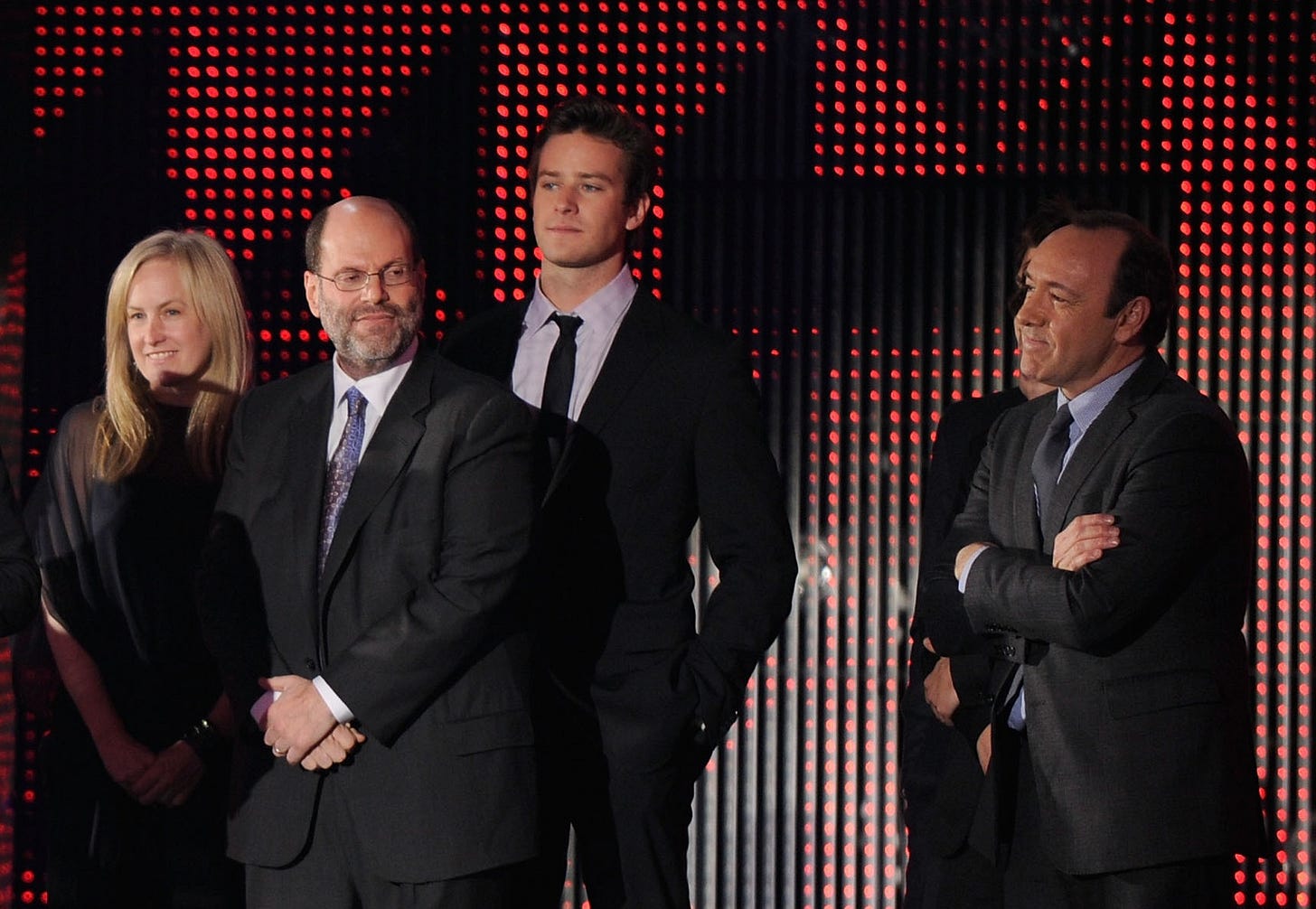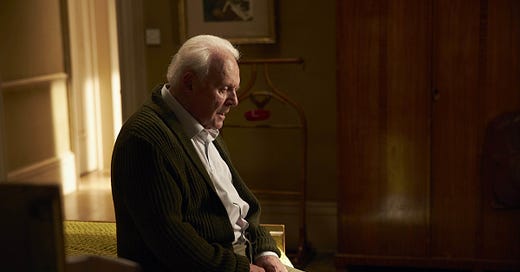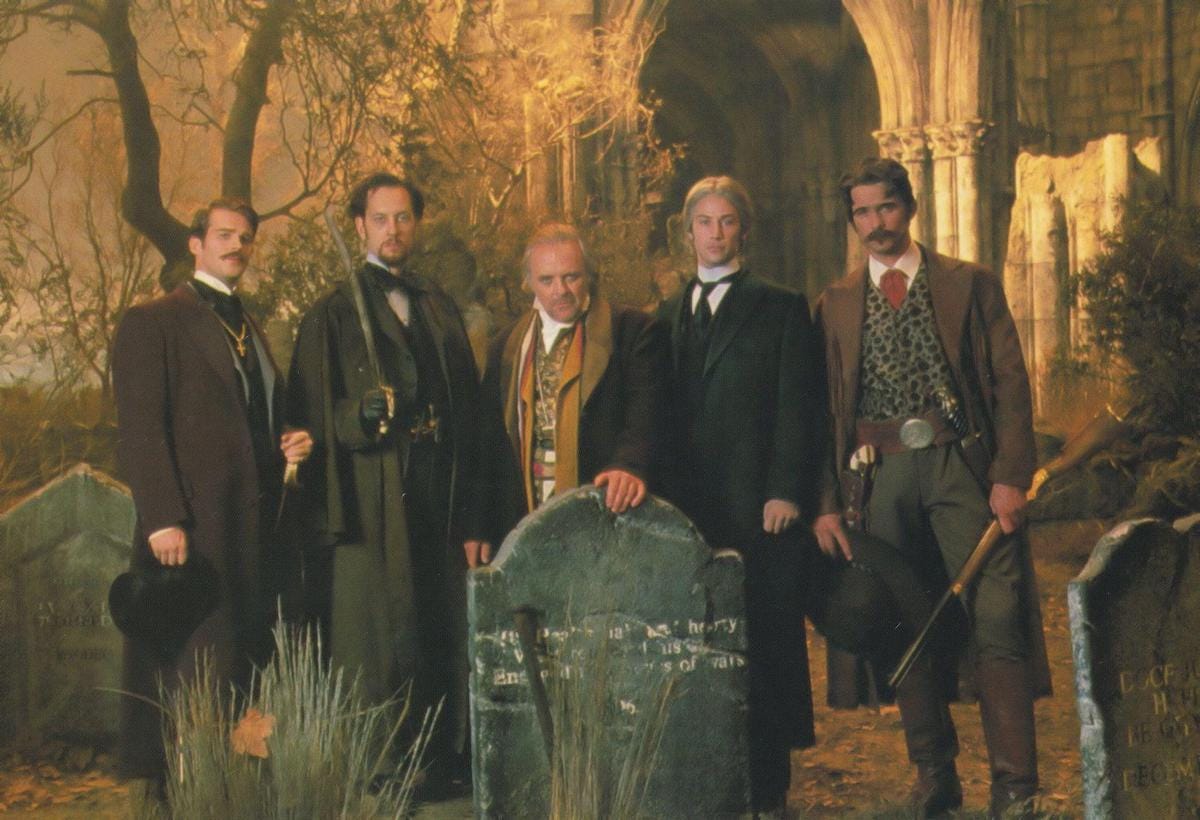
'The Father': The Best Best Picture Nominee
Plus: What are we to do with Scott Rudin, horrible boss?
Review: The Father (VOD, limited theatrical)
Before we talk about The Father—which is almost certainly the best of the best-picture nominees at this year’s Oscars and will likely land on my Best of 2021 list—let’s talk, briefly, about one of the worst movies of last year, Capone.
Capone is Josh Trank’s look at the last year or so of the life of Al Capone (Tom Hardy). In it, we see the once-fearsome gangster lose his mind and control of his bodily functions; the most famous scene in the film involves the titular character literally shitting the bed, an apt metaphor for the film writ large. Throughout the movie, we’re kept on our toes because we’re never sure who is real or what is happening. Capone’s syphilitic mind is slipping, conjuring up characters who don’t exist and forcing him to relive scenarios long past.
The whole thing is charitably described as ham-handed, with Hardy grunting and pooping his way through the proceedings like an animal terrified by the mental abattoir he’s found himself caged in.
What Capone gestured futilely at, The Father succeeds in bringing to terrifying life: Florian Zeller’s film, based on his 2012 play Le Père, is a masterful portrait of a man losing his mind, a point-of-view exploration of dementia that renders in honest detail the horrors of not being able to process who you are, where you are, even when you are.
Anthony (Anthony Hopkins) lives in a flat in London. It’s his flat, or maybe it’s the flat owned by his daughter, Anne (Olivia Colman), and her husband, Paul (Rufus Sewell). Or is Paul another man (Mark Gatiss)? And Anne another woman (Olivia Williams)? It’s hard for Anthony to keep track, and that’s why he needs help: Anne is bringing yet another live-in nurse to watch him, because she’s moving to Paris and cannot be his constant companion.
And if this doesn’t work, he’s going to have to be institutionalized.
Anthony can be witty and charming, as when he first meets Laura (Imogen Poots), his new nurse. He can also be cutting and cruel, as when he tells Laura that she laughs inanely at the slightest thing, or when he casually mentions that Lucy, absent for much of the picture, is his favorite daughter, deliberately doing so within earshot of Anne. Hopkins is spry and lively—he’s not physically crippled, his brain has simply stopped working properly—which makes everything more difficult, more harrowing.
Florian plays with point-of-view in a way that puts us squarely inside Anthony’s head space. Though the picture at first feels a bit play-like, mostly taking place within Anthony/Anne’s flat, it becomes clear very quickly that something cleverer and more cinematic is at work. Simply swapping Colman and Williams is as disconcerting for us as it is for Anthony; the viewer’s hand is held no more than the character’s, and his dislocation is our own. It’s the continuity of cinema—the very idea of being used to trusting our own eyes, what we’re seeing on screen—that renders what we’re watching so effective.
Effective, and stressful. As the film progresses, conversations repeat, loop, twist back in on themselves in different locations and at different times, with different actresses filling the role of Anne. The unsteadiness helps us absorb and appreciate Anne’s frustration and Anthony’s terror. This isn’t a horror movie, exactly, but it is a dark reminder that time comes for us all—and nothing is quite as scary as being failed by your own body.
The Father is very much an actorly showcase, and Hopkins and Colman are about as wonderful as you might expect. Colman in particular portrays a sort of a resolute sadness as Anne absorbs the slings and arrows of Anthony’s demented anger. She has sacrificed much for this man, and expects little in return. And Sewell/Gatiss deserve a note of praise for their work in returning Anthony’s casual cruelty in kind; it’s not easy to come across as sympathetic when you’re bullying a blinkered old man, but they almost pull it off.
If you’ve already seen the big monkey punch the big lizard and are trying to convince a friend or spouse to watch something a bit more cultured, consider sending them this review of The Father. I can’t guarantee I’ll talk them into it, but it’s worth a shot. And if you like this newsletter enough to share it, maybe consider chipping in to make sure I can keep writing it! Just $10 a month, and so much great #content.
What to do with Scott Rudin?

If you haven’t read the epic Hollywood Reporter story on Scott Rudin—the big-time producer behind No Country for Old Men and There Will be Blood, among many, many other movies, as well as a powerhouse Broadway producer—you really should. I mean, how often do you get to hear a story about abuse-by-potato?
But with Hollywood reexamining its power structures and inequities, Rudin's brand of aggro behavior is suddenly out of step in an industry championing egalitarianism. One recent Rudin assistant says the mercurial producer threw a baked potato at his head in 2018 for not knowing why someone from indie distributor A24 was in the lobby.
"I went into the kitchen, and I was like, 'Hey, Scott, A24 is on the way up. I'm not sure what it's concerning,' " he says. "And he flipped out, like, 'Nobody told me A24 was on my schedule.' He threw it at me, and I dodged a big potato. He was like, 'Well, find out, and get me a new potato.' "
There are other slightly more concerning stories (he asked a woman with diabetes to stop exercising in the morning so she could focus more on assisting him; he hit an assistant’s hand with a computer monitor, necessitating “medical attention”), but the long and the short of it is that Rudin is, well, kind of a raging asshole.
It’s important to note that this is not a Harvey Weinstein situation. No one is accusing Rudin of sexually assaulting anyone or using his power to procure sexual favors. It’s not a Brett Ratner or a Louis C.K. situation, where people were put into sexually uncomfortable situations. It’s more of a Devil Wears Prada situation, with a domineering, unreasonably demanding boss making life hell for subordinates.
And it’s not clear to me, or to anyone I’ve talked to, what the penalty for being a tyrant of a boss is supposed to be in the brave new world of an entertainment industry where people no longer live in fear of the moguls.
Up to now, the situation has basically been one or zero, all or nothing. You were either basically okay or you got the “death penalty” (think Weinstein, Kevin Spacey, etc.). Because there’s no controlling authority—no one who can say “Okay, big-shot producer, you’re in time out for the next year: no major projects for you”—there’s basically nothing to be done aside from everyone simply refusing to work with a person.
I don’t know what the answer is. I wish I did; it’s so much easier to write with righteous, fiery fury. I bring it up solely to ask you to think about it. Maybe Rudin will be chastened by all this and turn a new leaf; maybe being an asshole is part of the mix that helps him bring great movies and great plays into existence. In a perfect world, everyone would be nice to their assistants and no one would get a stapler thrown at their head. In the world we live in, however, I’m not entirely sure how an employer’s casual cruelty to his employee is, honestly, something I have any interest in being personally responsible for policing.
Assigned viewing: Bram Stoker’s Dracula (HBO Max)
Francis Ford Coppola’s 1992 adaptation of Bram Stoker’s introduction of the world to Dracula has had a critical reevaluation in recent years; shunned upon release, a fresh set of eyes has gazed upon Coppola’s horniness and adoption of silent film tics and decided it is, if not quite a masterpiece, then an underappreciated gem.
Having watched it for the first time this week, I can say that it is certainly an interesting movie and kudos to Coppola for really going for it, but man. It’s not good, folks! Keanu Reeves is terribly miscast as Brit Jonathan Harker and the madcap editing makes the whole thing feel like a coked-up romp. But despite all that, I was nodding off by film’s end. And I never nod off while watching a movie.
And yet! I recommend checking it out solely for the work of Anthony Hopkins as Abraham Van Helsing. He has such a droll manner of delivering the patently absurd lines that you can’t help but laugh. “Ja, she was in great pain. Then we cut off her head and drove a stake through her heart and burned it and then . . . then she found peace,” he says with a shrug and a straight face at one point when asked about a woman who had been turned into a vampire and then killed by the vampire slayer.
Anyway. Not a good movie, but an interesting failure, and those are oftentimes more entertaining than blandly successful pictures.












